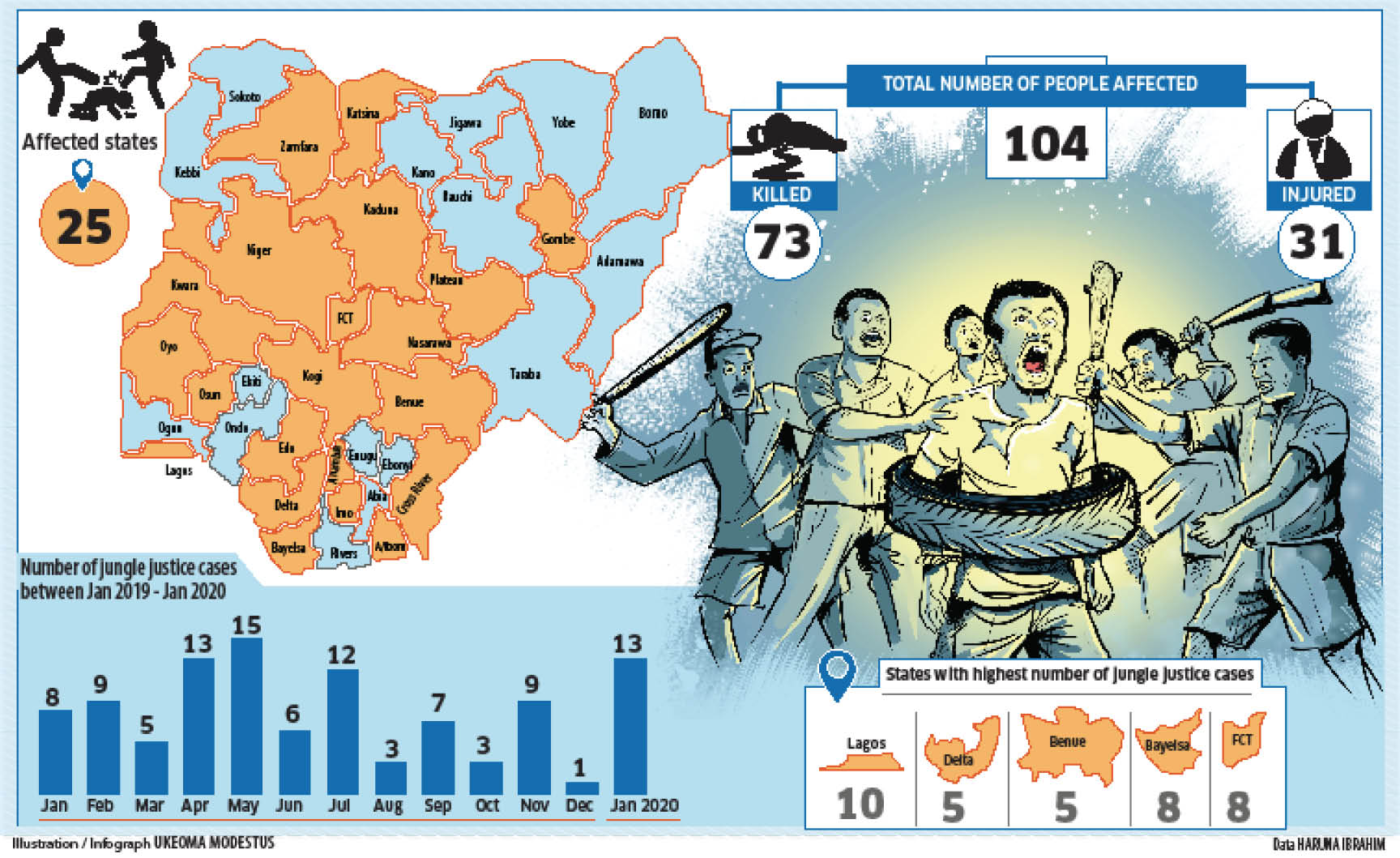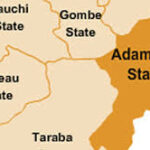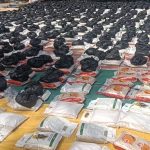- Why people resort to mob action – Experts
- Lagos, Bayelsa, FCT, C/River lead
No fewer than 105 persons have fallen victim of jungle justice in at least 25 of the 36 states of Nigeria between January and December last year, an investigation by Daily Trust has shown.
Checks showed that the Federal Capital Territory (FCT) is also not immune from people taking the laws into their hands. The number of people killed or injured did not include dozens of incidences that have not been reported by the media in different parts of the country.
Rising cases of jungle justice in Nigeria have been a major concern to human rights activists as it contravenes Section 33 (1) of Nigeria’s Constitution.
The section states: “Every person has a right to life and no one shall be deprived intentionally of his life, save in execution of the sentence of a court in respect of a criminal offence of which he has been found guilty in Nigeria.”
A review of newspaper reports by Daily Trust indicate that out of the number of victims within the period, 73 were reportedly killed by mob actions, while 31 others sustained various degrees of injuries from incidences of severe beatings.
Some of the victims were suspected to have committed crimes such as armed robbery, kidnapping and other related actions and were either stoned to death or set ablaze in the process.
The highest number of cases were recorded in Lagos and Bayelsa states, followed by Abuja, Cross River, Benue and Delta states. The other states where cases of jungle justice resulting in deaths or injuries to victims were recorded are Anambra, Ondo, Katsina, Ekiti, Edo, Enugu, Abia, Kwara, Oyo, and Nasarawa.
Others are: Ebonyi, Zamfara, Kaduna, Imo, Akwa Ibom, Kogi, Niger, Ogun and Plateau.
Among the victims were police officers, one-chance robbery suspects, suspected motorcycle thieves, alleged homosexuals and cattle rustlers.
Bizarre cases of mob action in Nigeria
One of the bizarre cases of jungle justice reviewed was recorded in Lagos in April last year, when a young man alleged to be a ‘Yahoo Boy’ was stripped naked and mercilessly beaten up by women for defecating near a shop.
The victim, who was accused of using excreta for an alleged ritual, was reportedly attacked and dragged by three women. Without a chance to explain himself, the young man was mobbed and also stripped naked as evidenced in a video on the incident that later went viral.
Another bizarre incidence of jungle justice was reported from Liokom village in Wanihem community, Yala Local Government Area of Cross River State, on May 29, 2019, where a man was allegedly buried alive by angry villagers for beheading his elder brother.
The man was said to have been buried in the same grave with his slain brother.
Also reviewed by Daily Trust was the case of a young man identified as Temitope Adeoye who was burnt to death after he was said to have been wrongly accused of being a thief at Cele-Ijesha area of Lagos State on Monday, February 11, 2019.
Temitope, who worked at Tin Can Island, Apapa Port, was on his way from the office that evening, when he met his death. He was said to have disembarked at Cele-Ijesha bus-stop, and was about to mount the commercial motorcycle that would take him home when some boys in the area started shouting “thief, thief” and pointing at him. Before he could say anything, he was rough handled, beaten up, stabbed and then set ablaze.
Another grim case of jungle justice was recorded in Lagos in July last year, when one Olamide Omolede, 22, was allegedly killed by hoodlums in Badore, Ajah, Lagos, after he was wrongly accused of stealing a mobile phone.
Among other victims of jungle justice in cases reviewed by Daily Trust was a suspected armed robber terrorising the Dakwa village in the Tafa Local Government Area of Niger State, who was lynched by a mob on January 25 this year.
The suspect was said to have dispossessed a motorcyclist of his motorcycle in Dakwa village and fled, but villagers quickly mobilised and gave him a hot chase until they caught up with him, beat him to pulp and set him ablaze.
The Police Public Relations Officer in the state, Mohammad Abubakar, confirmed the incident, but said no arrest was made as the mob left the scene before the cops got there.
Also reviewed was an incident at Tsambe Tsauni village of Mallamawa ward in Jibia Local Government Area of Katsina State, where three persons were killed by irate youths for allegedly giving tips and providing information to kidnappers.
Another incident was recorded in Abuja on September 29, last year, when a mob reportedly burnt to death three suspected kidnappers at Dutse Alhaji area.
The incident reportedly happened under the Dutse Bridge when a woman in a moving vehicle was heard screaming for help.
She was said to have been suddenly pushed out of the vehicle while screaming, prompting a motorist, who saw what had happened, to pull over in front of the vehicle and blocked it under the bridge.
Consequently, commercial motorcycle riders reportedly surrounded the vehicle and suspecting the occupants to be one chance, they started beating them and eventually set them ablaze, including the vehicle.
Why jungle justice persists in Nigeria – Experts
Some legal practitioners and security experts spoken to have given reasons why the practice has continued in the country.
Olalekan Ojo (SAN), who has defended several high profile criminal cases including the celebrated case of Chukwuemeka Ezeugo (Rev. King), said it has never been in doubt that there are several cases of jungle justice in the country.
“It is socially unacceptable because no citizen has the right, except in the manner stipulated by law, to take the life of another person,” he said.
On why cases of jungle justice are on the rise, he said it was a “demonstration of disenchantment in some quarters with the criminal justice system in the country.”
Ojo added that there were some cases that were “either poorly prosecuted or not prosecuted at all due to the absence of vital witnesses due to one reason or the other.
“So persons who ordinarily ought to have been convicted and sentenced to death may be released by the court after about three or four years of lack of diligent prosecution”, he said, adding that in such situation, such a person may return to society and continue with his criminal ways, which may lead the people in the society to decide to carry out instant justice, thereby also committing a crime.
On the role of lawyers, Ojo said it was unethical but not illegal for lawyers to reject the brief of an accused person even when the society has already passed a guilty verdict on such a person.
“No citizen also has the right to pronounce another person guilty of an offence. There could be cases where the person allegedly caught committing the offence might be insane or might have acted in what he reasonably believed to be self-defence… If the law has presumed someone to be innocent, who is that lawyer to say he is guilty?,” he said.
On whether people were resorting to mob action because governors are seen to be holding back in issuing execution warrant for condemned inmates, the senior lawyer said Section 407 of the Administration of Criminal Justice Act (ACJA) has provided a remedy for that.
He quoted the explanatory note of the section to have stated that, “Judge’s certificate of death sentence to be sufficient and full authority for execution of convict unless he is pardoned or reprieved.”
A security and intelligence expert, Dr. Amaechi Nwaokolo, said people resort to jungle justice because of the failure of our criminal justice system.
According to him, people also resort to taking the laws into their hands because they feel there is no need to go to the police.
“Justice is very slow in this part of the world. People are prone to report to the police but they do otherwise because of their lack of confidence for the courts to hand out justice.
“Our criminal justice system and the character of our police are making people perpetrate jungle justice because if people are confident, they will not take the laws into their hands,” Nwaokolo said.
Police speak on rampant mob actions
Reacting to the allegation that prosecution is one of the problems slowing down the criminal justice system and thereby encouraging mob actions, the officer in charge of the Legal Department of the FCT Police Command, CSP James Idachaba, said the problem is three-way and not just of the prosecution.
Idachaba, who led the prosecution team in the recently concluded trial of Maryam Sanda, said the defence team also sometimes frustrate trials by bringing up frivolous applications; and that even the court system does harm to a speedy dispensation of cases because of the heavy dockets of the courts.
He said the victims of some of these crimes do not help in speeding up the process. “Sometimes, some people report matters and when it is time for them to come to court to give evidence, they give a lot of problems to the prosecutor. They are reluctant to come forward to give evidence in a matter in which they are the victims.”
When contacted over the position of the police on mob killings of criminal suspects, the spokesman of Nigeria Police Force (NPF), DCP Frank Mba said it was a criminal offence.
He said, “our position is simple, private citizens can arrest persons suspected of committing crimes, however, as soon as they make such arrest, they are mandated to submit them to the police.
“Any other action would be an extrajudicial act. For citizens to carry out mob attack on suspects is condemnable; it is criminal to take the life of other citizens no matter the allegation.”
He added that citizens must be patient with the criminal justice system.
On his part, the Commissioner of Police in the FCT, Bala Ciroma, said there should be no justification for jungle justice. “It is rather unfortunate. There is a need for ample investigation to establish who did what and where so as to avoid doing the unfortunate thing of killing the innocent.”
On whether people were losing confidence in the justice system, Ciroma said it was all about patience and allowing the justice system to work.
“The criminal justice system is a process. You start from the police to the judiciary and back to prisons,” he added.
How jungle justice can be curtailed
A security expert, Dr. Amaechi Nwaokolo, said for jungle justice to be curtailed in Nigeria, the criminal justice system must be made to work. He also said there is need for relevant government agencies to step up the level of awareness on the need for people to desist from taking the laws into their hands.
“In order to avoid jungle justice in Nigeria, the judicial system must restore confidence in people who seek justice. The criminal justice system and law enforcement must be allowed to work very well.
“There is also the need for public enlightenment by relevant agencies such as the National Orientation Agency, on the need for Nigerians to desist from taking the laws into their hands and to report criminals to appropriate authorities,” Nwaokolo said.

 Join Daily Trust WhatsApp Community For Quick Access To News and Happenings Around You.
Join Daily Trust WhatsApp Community For Quick Access To News and Happenings Around You.


